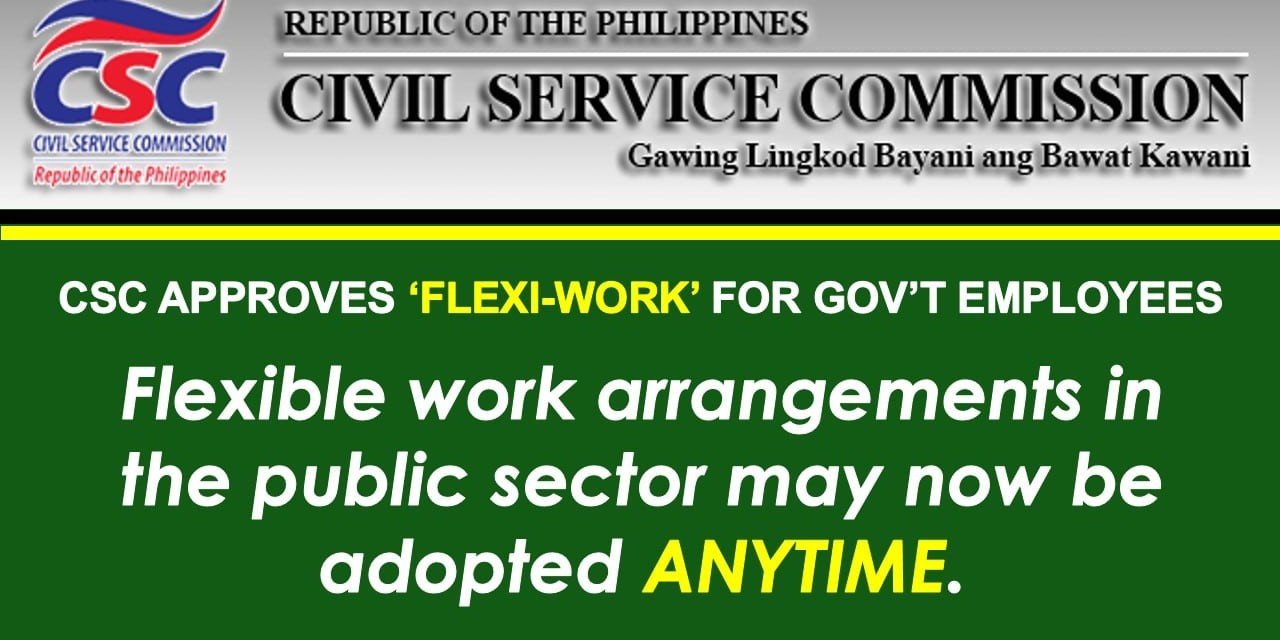In the public sector, flexible work arrangements can now be implemented at any moment.
The Civil Service Commission (CSC) authorized this in CSC Resolution No. 2200209, which was issued on May 18, 2022. The policy will go into effect fifteen (15) days after it is published (on May 31, 2022), or on June 15, 2022.
Flexible work arrangements are up to the agency’s director’s discretion, as long as all stakeholders are guaranteed uninterrupted service delivery from 8:00 AM to 5:00 PM, according to the CSC.
The Commission issued interim guidelines during the State of Public Health Emergency authorizing government agencies to implement alternative work arrangements based on the mandate and functions of the agency in order to respond to the exigencies of public service at the height of the pandemic, which limited government workers’ mobility.
As part of the nationwide effort to shift from a state of public health emergency to the new normal, the CSC is working to institutionalize flexible work arrangements. It serves as a preventative step to protect government officials’ and employees’ health, safety, and well-being while assuring the government’s continuous operations and efficient delivery of public services.
The CSC hopes that by implementing this policy, it will be able to improve work-life balance, encourage the use of information and communications technology (ICT) for remote work, and provide reasonable work arrangements for employees who are vulnerable, such as seniors, pregnant women, immunocompromised individuals, or those recovering from illness/injuries or mobility issues. Safe work conditions and adherence to occupational health and safety laws are ensured when flexible work arrangements are implemented.
The flexible work arrangement guidelines, which include 1.7 million government employees regardless of appointment status, will undoubtedly change the landscape of work in the country, as a counterpart strategy to the private sector’s Telecommuting Law. As the work environment becomes more sensitive to employees’ distinct individual demands, the CSC is optimistic that greater flexibility will lead to better productivity.
Work arrangements
Per the resolution, flexible work arrangements include:
(1) Flexiplace, wherein officials and employees may be authorized to render services away from their office;
(2) Compressed work week, in which the 40-hour work week is compressed into four (4) days or less, instead of five (5);
(3) Skeleton workforce, where a minimum number of personnel will be required to report to the office when full staffing is not possible;
(4) Work shifting for agencies required by law to operate 24/7 or agencies required to observe workplace health and safety protocols;
(5) Flexitime, where employees are allowed to report between 7 a.m. to 7 p.m. provided they complete the required 40-hour workweek; and
(6) Combination of flexible work arrangements that may be adopted by an agency according to what is appropriate or applicable to its mandate and functions.
Flexible work arrangements may be permitted on a regular or periodic basis, as well as for situational or medical reasons.
General requirements for flexible work arrangements
Agencies must ensure that the use of flexible work arrangements does not jeopardize, delay, or obstruct the delivery of government services, programs, or initiatives.
Additionally, agencies must develop internal standards for the chosen flexible work arrangement(s) and include them in their public service continuity plans. They must also implement performance criteria and timetables in compliance with Republic Act No. 11032, also known as the Ease of Doing Business and Efficient Government Service Delivery Act of 2018, as well as authorized work plans and targets.
In accordance with Republic Act No. 10173, also known as the Data Privacy Act of 2012, agencies may use monitoring mechanisms for daily or weekly reports, teleconferencing platforms for meetings or assemblies, and reasonable and appropriate security measures to ensure the confidentiality of official documents and information.
Employee benefits and support mechanisms
Government agencies must ensure that support mechanisms for the implementation of flexible work arrangements are in place, such as appropriate personal protective equipment for frontline service providers and transportation facilities for physically reporting employees, reimbursement of laboratory or medical expenses incurred during official travel, and reasonable expenses incurred during an imposed WFH arrangement, subject to existing budgeting, accounting, and auditing requirements.
Government agencies must give equitable opportunities to employees in terms of awards, promotions, and training; health or psychosocial interventions for mental well-being; and medical benefits for wounds or injuries received while performing official tasks, regardless of work arrangement.

